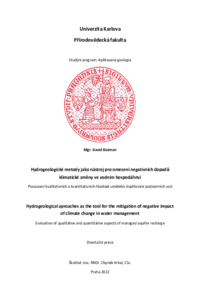Hydrogeologické metody jako nástroj pro omezení negativních dopadů klimatické změny ve vodním hospodářství: posouzení kvalitativních a kvantitativních hledisek umělého doplňování podzemních vod
Hydrogeological aproaches as the tool for the mitigation of negative impact of climate change in water management: Evaluation of qualitative and quantitative aspects of managed aquifer recharge
dizertační práce (OBHÁJENO)

Omezená dostupnost dokumentu
Celý dokument nebo jeho části jsou nepřístupné do 28. 02. 2026
Důvod omezené dostupnosti:
ochrana duševního vlastnictví, zejména ochrana vynálezů či technických řešení
Zobrazit/
Trvalý odkaz
http://hdl.handle.net/20.500.11956/179909Identifikátory
SIS: 145498
Kolekce
- Kvalifikační práce [21511]
Autor
Vedoucí práce
Oponent práce
Rapantová, Naďa
Pech, Pavel
Fakulta / součást
Přírodovědecká fakulta
Obor
Aplikovaná geologie
Katedra / ústav / klinika
Ústav hydrogeologie, inženýrské geologie a užité geofyziky
Datum obhajoby
1. 3. 2023
Nakladatel
Univerzita Karlova, Přírodovědecká fakultaJazyk
Čeština
Známka
Prospěl/a
Klíčová slova (česky)
hydrogeologie, umělá infiltrace, břehová infiltrace, mikropolutanty, klimatická změna;Klíčová slova (anglicky)
hydrogeology, artificial infiltration, bank filtration, micropolutants, climate change;Disertační práce se zabývá problematikou efektivnějšího využívání zdrojů podzemních vod v podmínkách probíhající klimatické změny se snížením přirozeným doplňováním hydrogeologických kolektorů. Zaměřená je na posouzení kvalitativních a kvantitativních hledisek umělého doplňování podzemních vod. Kromě přehledu problematiky umělého doplňování poskytuje práce dva výstupy. Prvním je kritické zhodnocení efektivity umělé infiltrace v podmínkách krystalinika, typických pro velkou část území České republiky, kde v současnosti umělá infiltrace není běžně aplikovaným postupem. Druhý klíčový výstup je monitoring výskytu nových typů mikropolutantů z kategorie tzv. emerging pollutants, které mohou omezovat využitelnost zdrojů pitných vod především v období klimatického stresu. Výzkum v rámci doktorského projektu probíhal na několika pilotních lokalitách a výsledky jsou publikované v odborných recenzovaných článcích. Získané poznatky potvrzují vhodnost postupu řízené dotace podzemních vod a značnou efektivitu atenuačních procesů horninového prostředí při odbourávání znečištění mikropolutanty.
The thesis adresses the issue of efficient use of groundwater resources under the ongoing climate change conditions, which results in reduced natural recharge of aquifers. It focuses on the assessment of qualitative and quantitative aspects of managed groundwater recharge. In addition to a review of the issues of artificial recharge, the thesis provides two outputs. The first one is a critical evaluation of the effectiveness of artificial infiltration in crystalline conditions, typical for a large part of the Czech Republic, where at present artificial infiltration is not a commonly applied procedure. The second key output is the monitoring of the occurrence of new types of micropollutants from the category of so-called emerging pollutants, which may limit the availability of drinking water sources, especially in periods of climatic stress. Research within the PhD project was conducted at several pilot sites and the results are published in peer-reviewed articles. The obtained findings confirm the suitability of the managed groundwater recharge procedure and the considerable effectiveness of attenuation processes of the aquifers in degrading micropollutant pollution.
